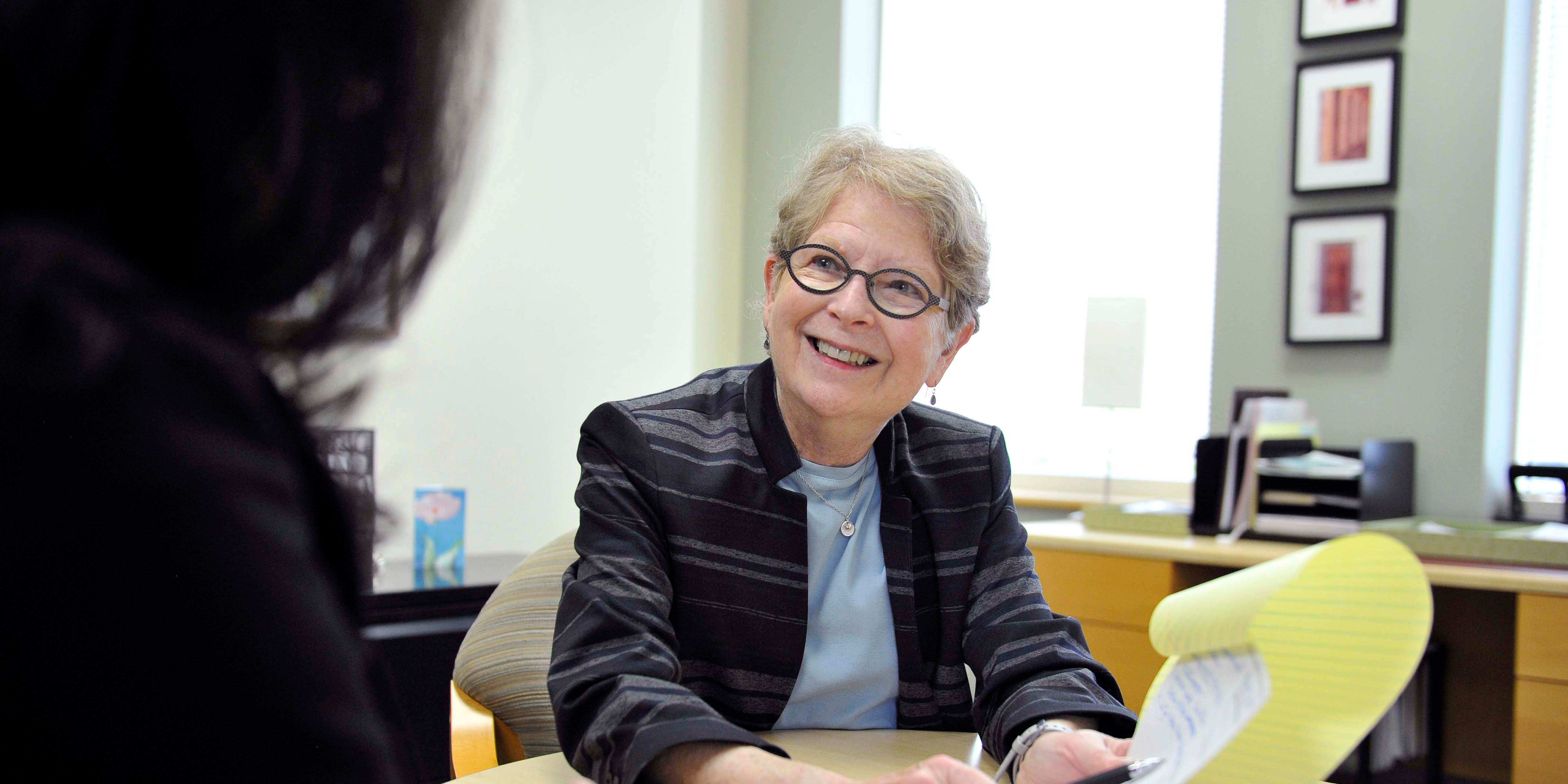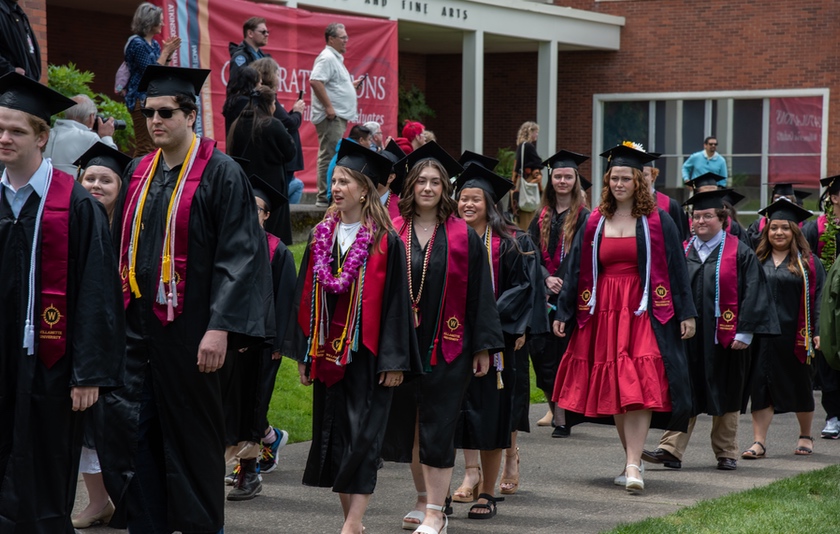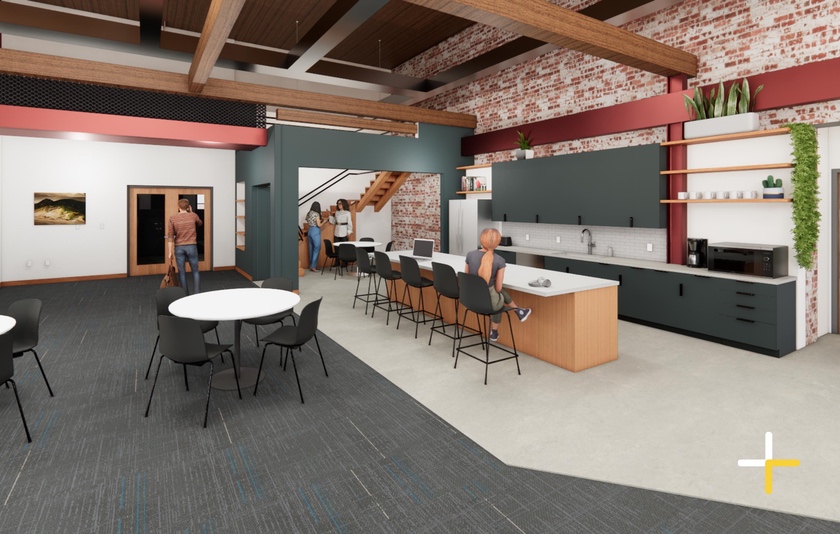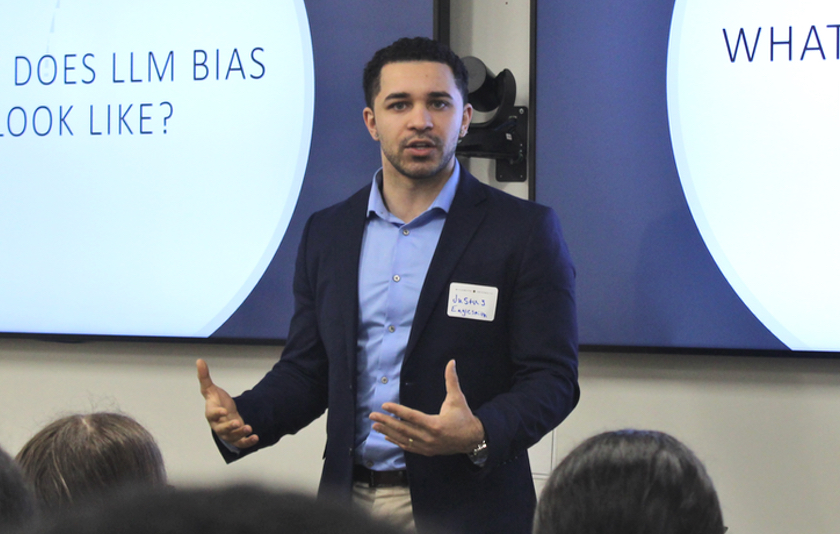Every September, Phylis Myles spends about three weeks mulling over piles of paperwork. As the assistant dean for career planning and development, she analyzes hobbies, legal areas of interest, sports affinities and other background information — all to match most of the Willamette Law first-year students with the attorney mentor who fits them best.
After weeks of intense work, she’s usually paired more than 100 students with attorneys from the Salem and Portland areas. At the end of the month, she and the Career Planning and Development Office team see it all come together. Bright-eyed students dressed in crisp, new suits gather at tables in Cat Cavern, excitedly chatting with, for some, the first lawyers and judges they’ve ever encountered.
“Phylis feels like she knows these people after seeing the forms,” says Bev Ecklund, career planning and development and externship program coordinator. “Looking around the room to see these people who haven’t ever met, having conversations — it’s great to see.”
With the COVID-19 pandemic, the 2020 kickoff was different — held virtually via Zoom and experiencing the technical difficulties most everyone is now familiar with. But that didn’t change the reasons to celebrate — another new school year, new connections and the program’s 30th year of mentorship.
Program beginnings
After a group of female students began being mentored in 1989, the formal Willamette Law Attorney-Mentor Program launched in 1990. Myles helped start a similar program at Lewis & Clark Law School in the early 1990s and has been leading Willamette’s since 2004.
For students, it initially offered a preview of what it was like to practice law.
“Over the years, the program has really grown,” Myles says. “The focus is helping students transition from being a student to being a professional. We encourage the mentors to think of teaching moments to help students learn professionalism: how to address emails, how to respond to clients, and trying out arguments.”
Willamette’s is the most robust and the oldest practitioner-student program in Oregon, Myles says, with a prescribed curriculum of conversation topics, events and other information.
In a normal year, mentors check in with their students via text messages or calls, meet with them for lunch, invite them to professional events or to shadow them at their practice, and practice interviewing. They get to know the students on a professional level, but with the one-on-one matching process, many connect on a deeper level and stay in touch for years, Myles says.
It’s the individualized attention to detail that makes the program so meaningful, says Nani Apo JD’13.
Personal connections
Just before she started her first year of law school, Apo met Myles at a retreat for incoming law students from diverse backgrounds. When she began her studies at Willamette and hadn’t yet signed up for the mentoring program, Myles noticed. She encouraged Apo to participate.
“I think she had in mind who she wanted to pair me with,” Apo recalls.
As someone who didn’t know any attorneys or know much about the practice of law, being paired with her mentor, Liani Reeves ’98, JD’01, was invaluable, she says. Reeves helped her with networking, navigating law school and becoming familiar and comfortable in the legal environment.
As Reeves’ mentee, Apo joined a new community.
“Every time we would be at an event, Liani had this tradition where she would gather all her mentees for a group photo,” Apo says. “At times, there would be a ton of people. I felt that I was a part of something bigger, this supportive network of people all connected through the mentor program.”
After her graduation, Apo joined the program as a mentor as soon as she could. In 2018, she won the Hon. Edward J. Howell Mentor of the Year Award for Excellence in Mentoring, following in the footsteps of her mentor, who also won the award in 2004.
“Watching her win and learning from her what makes a good mentor, then coming full circle and winning myself was especially rewarding,” Apo says.
Like Apo, when she graduated and passed the bar, Megan Hinzdel JD’18 immediately signed on to be a mentor. Law school is difficult, and it’s a specific experience that people only understand if they’ve been through it, she says. She considers it a privilege to share her knowledge and help other law students.
While at Willamette Law, Hinzdel served as president of OUTlaw, the LGBTQ student organization. As Myles pairs students and attorneys, Hinzdel is often assigned those who request an LGBTQ mentor.
“I think we’re able to connect on a different level,” Hinzdel says. “We have some shared experiences. Historically, LGBTQ people have been discriminated against using laws, so being able to help those students go through law school and learn how to change the law in their favor is important to me.”
When students see other people like themselves in the legal community, they also feel more comfortable, she says. Through mentoring, she enjoys being there for students like herself as they finish out law school and pursue legal change.
Celebrating 30 years
Each year for the past 30, Salem attorney Roger Evans JD’80 has been one of the first to sign up as a mentor in the program, Myles says. He usually has one to three mentees at once, with one from each class, but in 2020, he had four.
With two first-year students interested in rock climbing, Myles put in a special request. An outdoors enthusiast and faithful mentor, Evans, of course, agreed to take both.
Evans is one of the program’s only 30-year mentors, so in fall 2020, he was honored with the Special Award for Continued Support of the Mentoring Program. He takes great enjoyment in mentoring and likes showing students what it’s like to be a lawyer, as well as how to balance life outside the practice.
When he was in law school, there was nothing like the mentor program, and “it’s those practical aspects of law school that students really need,” he says.
When Myles first started her work with the program, only around half of the 1L class members participated. In more recent years, anywhere from 85-98% of the 1Ls signed up. In 2020-21, despite the challenges of COVID, all but six first-year students asked for mentors.
“It’s strictly voluntary, so that’s even more impressive with being remote, that the students still recognized the value of mentoring,” Ecklund, the placement coordinator, says. “Admissions really talks about the program a lot. Students contact us before enrolling to talk about it.”
Although some students and mentors did not meet in person much due to the pandemic, they found other ways to connect through Zoom, calls or texting. The Career Planning and Development team checked in with mentors and their students more frequently to ensure everyone’s needs and expectations were met.
Despite difficulties like COVID, with 30 years under its belt and strong support from the legal community, Myles is sure the Attorney-Mentor Program will continue developing new lawyers who will advocate for justice for years to come.
“At Willamette, it’s kind of a culture-thing,” Hinzdel explains. “Everyone’s going to have a mentor, and you’re all making connections. Law school, in general, is about those connections.”




